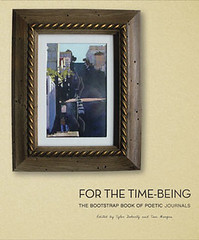
Near the end of an extended email conversation I had with Joanne Kyger (who may arguably be considered the founder of American poetic journals), she defined the genre: 'Poetic journal' ....for me it means a kind of movement back and forth from prose-like descriptive narrative bridges into shorter 'poem' like lines. Like the haibun style. And the element of time, happening in the moment, aware of the moment. Tight, spare. Etc. (20 October 2005).
During our conversation, Kyger kept linking the poetic journal lineage to the Japanese "nikki," a la "nikki bungaku" and "nikki uta." In an essay about this lineage, Hank Glassman has this to say about Japanese poetic diaries. (Notice how similar this sounds to Kyger's definition):
"The first work of Japanese prose, Tosa nikki, compiled by Ki no Tsurayuki around 935, belongs to a genre known to modern scholars as the poetic diary, uta nikki. The poetic diaries of classical Japanese literature are anthologies of poems strung together by narrative prose sections. Often these works, especially travel diaries, were intended as primers of poetry in which the author would offer critique of the poems collected, note their successful aspects, and point up their deficiencies. In such a case, the poems could have all been composed by the author and spoken by characters in the diary; they could be actual poems received from lovers, family members, and other corespondents, or ones heard at poetry gatherings. These works, several of which will be discussed below and referred to simply as diaries, were not kept as records of daily events, but rather written as reminiscences, remembrances of the past based on draft copies of poems sent and saved scraps of poems received."
This is interesting take on poetic journals, however, I don't entirely ascribe to idea that this definition works for poetic journals as Tyler Doherty and I describe them in For the Time Being, especially the anthologizing aspect of the poems, or the idea that they are a kind of working notebook. Doherty makes a clear distinction between the intention of a writer's notebooks and the intention of a poetic journal (the first being private writing that is published secondarily, the second being writing that is personal, but that is still intended for publication, or at least an audience beyond the writer herself). With that said, I am interested in how this idea of the poetic journal as a series of "poems strung together by narrative prose sections" fits into the genre as a whole. If we viewed poetic journals strictly through this prism, we would be forced to eliminate a number of very fine writers from the booklist including Paul Blackburn , Larry Eigner, and even Doherty himself. If looked at this way, however, it does shed some light on the working process of writers like Andrew Schelling, Kyger, Michael Rothenberg, and Gary Snyder, who all write poetic journals that conform to this somewhat narrow definition.
More than anything, I think this definition tells us how closely aligned these Beat and post-beat writings are to the Japanese nikki. Another interesting tidbit is that Kyger's lauded journal of her Japanese experiences with Snyder, Strange Big Moon, is not written in the nikki style. In my conversations with Kyger, I have learned that she simply had not read the Japanese poetic diaries until the mid 1970s or so. After she reads these diaries, however, her writing unquestionably changes.
In conclusion, I'm still in favor of poetic journals casting a wider net. I see the usefulness of the poetic diary form, and I do view poetic diaries as a subset of poetic journals, but it would seem a shame to me to limit the genre to such narrow confines.

No comments:
Post a Comment